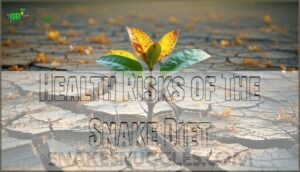This site is supported by our readers. We may earn a commission, at no cost to you, if you purchase through links.

You’ll face nutrient deficiencies when going days without food, plus dangerous electrolyte imbalances from the "snake juice" formula.
Your body breaks down muscle tissue for energy, while heart rhythm problems can develop from mineral depletion.
Dizziness, fatigue, and dehydration are common as your system struggles to function.
The restrictive approach often triggers unhealthy eating patterns and can worsen existing medical conditions.
Unlike sustainable intermittent fasting, this diet lacks scientific backing and poses real medical risks.
Understanding these specific dangers can help you make safer choices.
Table Of Contents
- Key Takeaways
- Snake Diet Dangers
- Snake Juice Side Effects
- Health Risks of The Snake Diet
- Snake Diet Vs. Intermittent Fasting
- Snake Diet Phases and Their Risks
- Why The Snake Diet is Not Sustainable
- Alternatives to The Snake Diet
- Frequently Asked Questions (FAQs)
- How long do you do the snake diet?
- What are the side effects of snake juice?
- How many calories should I have on the snake diet?
- What is the snake diet water fasting?
- What are the Snake Diets effects on mental health?
- How does the Snake Diet impact relationships with food?
- What role does the Snake Diet play in causing dehydration?
- Can the Snake Diet lead to a decrease in athletic performance?
- Can children or teenagers follow the snake diet?
- Is the snake diet safe during pregnancy?
- Conclusion
Key Takeaways
- You’ll face dangerous electrolyte imbalances and dehydration – The Snake Diet’s extreme fasting periods and "snake juice" formula can trigger heart rhythm problems, muscle weakness, and organ dysfunction from mineral depletion.
- Your body will break down muscle tissue for energy – Extended fasting forces your body into starvation mode, causing protein depletion, metabolic slowdown, and weakened immunity that makes future weight loss harder.
- You’re at risk for severe nutrient deficiencies – Getting only 3,500 calories weekly creates dangerous vitamin and mineral deficits that can lead to bone loss, organ dysfunction, and compromised immune function.
- The diet can trigger eating disorders and unhealthy food relationships – The extreme restriction often leads to binge-restrict cycles, food obsession, and psychological issues that damage your long-term relationship with eating.
Snake Diet Dangers
The Snake Diet pushes your body into dangerous territory with extreme fasting periods that can trigger serious health complications.
You’re basically starving yourself while relying on an electrolyte drink that can’t replace the nutrients your body desperately needs during these prolonged fasts.
Restrictive Fasting Risks
Here’s the 60-word content for "Restrictive Fasting Risks":
Three major fasting dangers can wreck your health when you’re severely restricting calories.
Your body enters starvation mode, slowing metabolism and hoarding fat.
Your metabolism crashes while your body desperately clings to every calorie.
Here’s what you’re risking:
- Malnutrition risks from inadequate nutrient intake
- Dehydration effects leading to organ damage
- Electrolyte imbalance causing heart problems
- Snake diet risks including muscle wasting
- Intermittent fasting risks when taken to extremes
Understanding health fasting risks is vital to avoid these dangers.
Muscle Breakdown and Loss
Extended fasting periods trigger muscle breakdown when your body can’t access adequate protein.
This metabolic slowdown from muscle loss makes future weight loss harder.
Your body breaks down lean tissue for energy, creating protein depletion that weakens immunity and physical strength.
Fasting risks include muscle wasting from severe nutritional deficiencies and hormone imbalance.
Nutrient Deprivation and Deficiencies
The Snake Diet’s extreme calorie restriction creates severe nutrient deficiencies and malnutrition risks.
You’re getting only 3,500 calories weekly—far below healthy requirements.
This vitamin deficit and mineral loss triggers dangerous starvation effects.
Your body can’t function properly without essential nutrients, leading to weakened immunity, bone loss, and organ dysfunction.
Electrolyte imbalance compounds these risks substantially.
Dizziness and Fatigue
When hunger strikes back, your body fights with dizziness and crushing fatigue.
Prolonged fasting creates perfect storm conditions for these debilitating symptoms through multiple pathways:
- Low Blood Sugar episodes – Your brain’s fuel supply drops dangerously low, triggering energy crashes and confusion
- Dehydration Effects compound – Fluid loss amplifies lightheadedness while your body struggles to maintain basic functions
- Electrolyte Imbalance disrupts – Critical minerals become depleted, causing muscle weakness and disrupted hunger signals throughout your system
Snake Juice Side Effects
While Snake Juice might sound harmless, it can trigger serious side effects that put your health at risk.
The electrolyte blend contains high sodium levels and other compounds that can disrupt your body’s natural balance, leading to dangerous complications.
Electrolyte Imbalance and Heart Issues
Your body can’t handle the chaos when electrolytes go haywire. Sodium imbalance and potassium deficiency from Snake Juice create dangerous cardiac risks.
Heart palpitations signal trouble brewing, while dehydration risks stress your kidneys. Electrolyte disturbances don’t mess around—they can trigger serious heart problems requiring immediate medical attention.
Understanding the electrolyte balance is essential to mitigating these risks.
| Electrolyte Issue | Symptoms | Heart Impact |
|---|---|---|
| Sodium Imbalance | Confusion, seizures | Arrhythmias, cardiac arrest |
| Potassium Deficiency | Muscle weakness, fatigue | Dangerous palpitations |
| Dehydration | Dizziness, headaches | Increased heart rate |
| Kidney Strain | Reduced urine output | Fluid retention, hypertension |
Muscle Cramps and Weakness
Don’t brush off those muscle cramps—they’re your body’s SOS for better Electrolyte Balance.
When you sip Snake Juice, you might skip essential potassium and magnesium, leading to Muscle Fatigue and Weakness Causes.
Dehydration risks creep in, too.
For Cramp Prevention, make sure you’re not running low on minerals.
A diet missing electrolytes sets up muscle cramps and persistent fatigue.
Interaction With Medications and Health Conditions
Beyond muscle cramps, Snake Juice poses serious medication interactions and health condition risks.
The high sodium content can worsen kidney health problems and amplify drug side effects from blood pressure medications.
People with underlying health conditions like diabetes face disease complications including dangerous blood sugar swings.
Pharmaceutical reactions become unpredictable when combined with extreme fasting.
Pregnancy precautions and breastfeeding precautions are especially critical, as nutrient restriction can harm both mother and child.
It’s essential to understand food drug interactions to minimize potential health risks when consuming Snake Juice.
Overconsumption Risks
Consuming excessive Snake Juice creates dangerous electrolyte overload that strains your kidneys and heart.
The high sodium intake can trigger hypertension while causing severe dehydration risks despite the liquid consumption.
This metabolic slowdown compounds nutrient deficiencies, pushing your body toward starvation mode.
- Electrolyte Overload: Excessive minerals overwhelm your system, causing dangerous imbalances
- Kidney Strain: Your kidneys can’t process the mineral surplus effectively
- Cardiovascular Stress: High sodium intake elevates blood pressure and heart rate
- Metabolic Disruption: Nutrient imbalance triggers starvation mode responses
Health Risks of The Snake Diet
When you push your body through extreme fasting periods like the Snake Diet demands, you’re basically forcing it into survival mode with serious health consequences.
The diet’s severe calorie restriction and prolonged fasting create a dangerous combination that can lead to malnutrition, dehydration, and eating disorders while increasing your risk of chronic diseases.
Malnutrition and Dehydration
The Snake Diet’s extreme calorie restriction creates a perfect storm for serious health complications.
You’re basically starving your body while flooding it with sodium.
This dangerous combination triggers malnutrition signs like fatigue and hair loss, while dehydration risks compound the problem.
Your body enters starvation mode, desperately clinging to fat stores.
Meanwhile, electrolyte imbalance from excessive Snake Juice consumption can cause dangerous heart rhythms and muscle weakness.
Eating Disorders and Unhealthy Relationships With Food
Extreme calorie restriction like the Snake Diet creates a dangerous breeding ground for eating disorders.
You’re basically training your brain to fear food, which can spiral into serious psychological issues.
The restrictive nature triggers four concerning patterns:
- Food Obsession – Constant thoughts about when you’ll eat next dominate your mental space
- Body Image Distortion – Harsh self-criticism and unrealistic body expectations become normalized
- Binge Eating Disorder – Severe restriction often leads to uncontrollable overeating episodes
- Emotional Eating – Using food restriction as punishment or control mechanism damages your relationship with nourishment
This diet’s all-or-nothing approach mirrors classic disordered eating patterns.
Food Addiction becomes more likely when you’re constantly cycling between deprivation and brief feeding windows, creating an unhealthy psychological relationship with eating.
Increased Risk of Chronic Diseases
Prolonged fasting frequently triggers dangerous health complications.
Snake Diet practitioners face elevated risks of cardiovascular disease, kidney damage, and liver problems.
Severe calorie restriction causes metabolic slowdown and bone loss, while electrolyte imbalances threaten organ failure.
| Health Risk | Snake Diet Impact |
|---|---|
| Cardiovascular Disease | 91% higher death risk from heart issues |
| Kidney Damage | Dehydration increases stone formation risk |
| Liver Problems | Malnutrition can cause fatty liver disease |
| Bone Loss | Calcium deficiency leads to osteoporosis |
These dieting hazards mirror keto diet dangers but amplified through extreme restriction.
Snake Diet Vs. Intermittent Fasting
While intermittent fasting offers flexibility with various eating windows, the Snake Diet takes restriction to dangerous extremes with 48-96 hour fasts that can trigger serious health complications.
You’ll find that traditional intermittent fasting methods like 16:8 or 18:6 provide weight loss benefits without the severe nutrient deficiencies and electrolyte imbalances that make the Snake Diet a risky choice for your health.
Key Differences and Similarities
Understanding these fasting methods requires examining their core differences.
Both approaches restrict eating windows, but the Snake Diet takes extreme measures that pose serious health impacts.
The Snake Diet’s prolonged fasting creates dangerous electrolyte imbalance and fasting complications that don’t occur with standard intermittent fasting.
| Aspect | Snake Diet | Intermittent Fasting |
|---|---|---|
| Fasting Duration | 48-96 hours | 12-24 hours |
| Eating Window | 1-2 hours | 4-8 hours |
| Calorie Restriction | Severe (3,500/week) | Moderate |
| Medical Supervision | None recommended | Often suggested |
While both methods can trigger ketosis for weight loss, the Snake Diet’s extreme approach increases dieting hazards substantially compared to traditional fasting methods.
Benefits and Drawbacks of Each Approach
How do these fasting methods stack up against each other? Both approaches offer distinct benefits and drawbacks that affect your health outcomes and weight loss journey.
| Aspect | Snake Diet | Intermittent Fasting |
|---|---|---|
| Fasting Duration | 48-96 hours with severe restriction | 12-24 hours with flexible eating |
| Nutrition Planning | Limited meal variety, high deficiency risk | Balanced meals during eating windows |
| Weight Loss Pattern | Rapid but unsustainable results | Gradual, maintainable progress |
| Health Outcomes | Electrolyte imbalance, dehydration risks | Lower fasting complications |
| Long-term Safety | Fasting side effects, low carb risks | Safer metabolic adaptation |
The Snake Diet’s extreme approach creates serious fasting complications, while traditional intermittent fasting allows proper nutrition planning without dangerous electrolyte imbalances. The Snake Diet promotes the use of Snake Juice beverages for electrolyte balance, despite questionable dosage guidelines.
Which is More Sustainable and Effective for Weight Loss
When comparing sustainability and effectiveness for weight loss, intermittent fasting clearly outperforms the Snake Diet.
Long-term adherence becomes nearly impossible with the Snake Diet’s extreme restrictions, while intermittent fasting offers realistic calorie intake and better lifestyle integration.
| Factor | Snake Diet | Intermittent Fasting |
|---|---|---|
| Nutritional adequacy | Severely compromised | Maintained with proper planning |
| Psychological impact | High risk of disorders | Generally positive |
| Sustainability | Poor long-term adherence | Flexible and adaptable |
You’ll face significant weight loss risks and electrolyte imbalance with the Snake Diet’s dangerous approach.
Fasting side effects multiply when you’re basically starving yourself.
Snake diet dangers include muscle loss and metabolic damage that make sustainable weight loss impossible.
Snake Diet Phases and Their Risks
Each phase of the Snake Diet carries distinct health risks that can seriously harm your body.
Phase 1’s extreme 48-hour fasting period followed by minimal eating creates dangerous nutrient deficiencies.
Phase 2’s prolonged 48-96 hour fasts with brief refeeds can lead to severe electrolyte imbalances and metabolic disruption.
Phase 1 Risks: Restrictive Eating and Nutrient Deficiencies
Phase 1’s extreme calorie restriction creates serious health risks you can’t ignore.
This initial phase drops your intake to just 3,500 calories weekly—far below safe recommendations. Your body enters starvation mode, triggering dangerous nutrient deficiencies and metabolic slowdown.
Understanding the risks of electrolyte imbalances is essential to avoiding severe health complications.
- Severe nutrient deficit from inadequate vitamins and essential minerals
- Dehydration effects and electrolyte imbalance causing weakness and dizziness
- Ketosis risks including fatigue, headaches, and potential cardiac complications
Phase 2 Risks: Overconsumption of Protein and Lack of Balance
Phase 2 brings dangerous protein imbalance and severe calorie deficit.
Your body faces nutrient deficiencies while cycling through 48-96 hour fasts.
This creates fasting dangers including protein depletion and muscle loss.
The metabolic slowdown from extreme restriction compounds ketosis risks.
Macronutrient Excess Issues
Electrolyte imbalance becomes critical when your system can’t maintain proper mineral levels during extended fasting periods.
Why The Snake Diet is Not Sustainable
You might wonder why anyone would abandon the Snake Diet after trying it, but the answer becomes clear when you examine the lack of scientific backing and serious health consequences.
The extreme fasting approach creates unsustainable physical and mental stress that makes long-term adherence nearly impossible for most people.
Lack of Scientific Evidence and Long-Term Studies
Here’s the lack of scientific evidence behind the Snake Diet that should make you think twice:
Research gaps plague this extreme fasting approach. No peer-reviewed clinical trials have evaluated the Snake Diet’s safety or effectiveness. Study limitations are glaring – there’s zero data analysis on long-term outcomes or nutritional adequacy.
- Longterm fasting studies don’t exist for this specific protocol
- Evidence based research is completely absent from major health organizations
- Metabolic slowdown, dehydration, and electrolyte imbalances lack proper documentation
You’re basically becoming a test subject without lack of scientific evidence to guide you safely.
Negative Impact on Mental and Physical Health
Your body pays a heavy price when you embrace this extreme approach.
Mental Strain manifests as anxiety, depression, and obsessive food thoughts, while Physical Harm includes fatigue, dizziness, and Nutrient Loss.
The combination triggers Health Decline through nutritional deficiencies, dehydration, and electrolyte imbalance, creating serious Wellness Risks that compound over time.
Understanding the snake diet health risks is essential to making informed decisions about this diet.
| Mental Health Impact | Physical Health Impact |
|---|---|
| Anxiety and depression | Chronic fatigue and weakness |
| Obsessive food thoughts | Dizziness and fainting spells |
| Body image distortion | Muscle loss and bone density decline |
Alternatives to The Snake Diet
You don’t have to stick with the Snake Diet’s dangerous approach to lose weight. Several evidence-based alternatives offer sustainable results without risking your health through extreme fasting or nutritional deficiencies.
Balanced Eating and Healthy Weight Loss Strategies
The right approach puts your health first, not rapid weight loss.
Evidence-based strategies help you lose weight safely while avoiding nutritional deficiencies and electrolyte imbalance that plague extreme diets.
Consider these sustainable lifestyle changes:
- Portion control using smaller plates and measuring servings prevents overeating
- Meal planning with healthy snacks reduces impulse food choices
- Nutrient balance from all food groups prevents deficiencies and supports metabolism
- Regular physical activity combined with adequate hydration prevents dehydration
- Professional guidance helps identify early signs of disordered eating.
These methods promote gradual weight loss of 1-2 pounds weekly, avoiding the diet pills dangers associated with restrictive eating patterns.
A well-planned diet should focus on healthy weight loss strategies to achieve long-term success.
Mindful Eating and Self-Care Practices
Trading the Snake Diet’s extreme restrictions for mindful eating creates a foundation for lasting wellness.
This approach helps you recognize disordered eating patterns and develop Healthy Habits that support both physical and mental health.
Intuitive Eating teaches you to trust your body’s natural hunger and fullness signals, breaking free from unhealthy relationship with food cycles.
Self Love practices combat body image issues that restrictive diets often create.
Focus on Emotional Wellness through daily self-care routines that nourish your mind and body.
By exploring Mindful Eating Books, individuals can gain a deeper understanding of healthy relationships with food.
Mindful Eating Tips Self-Care Practices
This Balanced Lifestyle approach prevents eating disorders while building sustainable habits.
Seeking Professional Help and Support for a Healthy Lifestyle
Professional support makes breaking free from extreme diets safer and more sustainable.
Healthcare providers can monitor your health risks while you shift to balanced eating patterns. Working with qualified professionals guarantees your overall health and wellbeing remain protected throughout your wellness journey.
Utilizing effective nutrition counseling strategies is essential for long-term success.
- Medical Guidance from physicians to assess underlying health conditions and monitor key signs during diet shifts
- Nutrition Counseling with registered dietitians who create personalized meal plans based on your specific needs and goals
- Lifestyle Coaching from certified wellness professionals who help establish sustainable healthy habits without restrictive patterns
- Wellness Support through therapists specializing in eating disorders who address the psychological aspects of holistic health recovery
Frequently Asked Questions (FAQs)
How long do you do the snake diet?
The Snake Diet’s phases can stretch indefinitely – you’ll cycle through 48-96 hour fasts with brief eating windows, potentially for months or years.
This extreme approach poses serious health risks and isn’t sustainable long-term.
What are the side effects of snake juice?
Like drinking liquid lightning, you’ll experience dangerous electrolyte imbalances, high blood pressure, cramping, diarrhea, and dehydration. The excessive sodium and magnesium can cause serious cardiovascular and digestive complications.
How many calories should I have on the snake diet?
The Snake Diet recommends dangerously low calorie intake – just 3,500 calories weekly, far below healthy guidelines of 11,200-21,000 weekly. This extreme restriction risks malnutrition and health complications.
What is the snake diet water fasting?
Dramatically extreme water fasting pushes your body to dangerous limits through prolonged periods without food.
You’ll consume only "Snake Juice" (an electrolyte drink) during 48-96 hour fasts, risking severe dehydration, electrolyte imbalances, and nutritional deficiencies that can cause cardiac issues.
What are the Snake Diets effects on mental health?
Extended fasting periods can trigger anxiety, depression, and obsessive thoughts about food.
You’ll likely experience mood swings, irritability, and social isolation from avoiding meals with others, potentially developing disordered eating patterns.
How does the Snake Diet impact relationships with food?
Sarah binged for hours after her 72-hour fast ended, then felt overwhelming guilt and shame.
You’ll develop an all-or-nothing mindset that destroys food intuition, creates binge-restrict cycles, and triggers disordered eating patterns through extreme deprivation.
What role does the Snake Diet play in causing dehydration?
The Snake Diet causes dehydration through prolonged fasting periods and optional "dry fasts" that restrict both food and water intake. You’ll face heightened dehydration risk when following this extreme regimen.
Can the Snake Diet lead to a decrease in athletic performance?
Yes, you’ll likely experience decreased athletic performance on the Snake Diet.
Prolonged fasting causes dizziness, headaches, and fainting, making exercise unsafe.
Your body lacks adequate fuel, leading to fatigue and impaired physical capabilities during workouts.
Can children or teenagers follow the snake diet?
No, children and teenagers shouldn’t follow the Snake Diet.
Their growing bodies need consistent nutrition and adequate calories daily.
This extreme fasting approach can severely harm development, growth, and mental health in young people.
Is the snake diet safe during pregnancy?
No, you shouldn’t follow the snake diet during pregnancy. The extreme calorie restriction and prolonged fasting can harm both you and your baby’s development, potentially causing nutrient deficiencies and complications.
Conclusion
Like a ticking time bomb waiting to explode, the Snake Diet’s extreme protocols pose serious threats to your health.
The snake diet dangers we’ve discussed reveal why this approach isn’t worth the risk.
From muscle breakdown to heart rhythm problems, these health consequences can have lasting effects.
Instead of gambling with your wellbeing, choose sustainable eating patterns backed by science.
Your body deserves better than dangerous shortcuts to weight loss.

















